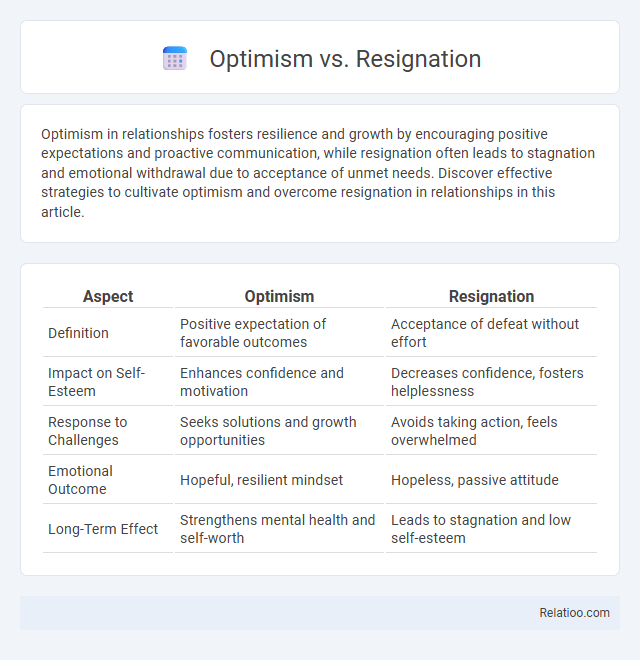Optimism in relationships fosters resilience and growth by encouraging positive expectations and proactive communication, while resignation often leads to stagnation and emotional withdrawal due to acceptance of unmet needs. Discover effective strategies to cultivate optimism and overcome resignation in relationships in this article.
Table of Comparison
| Aspect | Optimism | Resignation |
|---|---|---|
| Definition | Positive expectation of favorable outcomes | Acceptance of defeat without effort |
| Impact on Self-Esteem | Enhances confidence and motivation | Decreases confidence, fosters helplessness |
| Response to Challenges | Seeks solutions and growth opportunities | Avoids taking action, feels overwhelmed |
| Emotional Outcome | Hopeful, resilient mindset | Hopeless, passive attitude |
| Long-Term Effect | Strengthens mental health and self-worth | Leads to stagnation and low self-esteem |
Understanding Optimism: Foundations and Benefits
Understanding optimism involves recognizing it as a cognitive mindset characterized by positive expectations about future outcomes, which can enhance mental resilience and overall well-being. Your optimistic perspective influences motivation, decision-making, and stress management, leading to improved psychological and physical health. Research indicates that fostering an optimistic outlook reduces the risk of chronic illnesses and promotes faster recovery from adversity, highlighting its foundational role in personal growth.
What Is Resignation? Causes and Consequences
Resignation is the acceptance of a situation perceived as inevitable or unchangeable, often leading to passive behavior and a loss of motivation. Causes of resignation include prolonged stress, repeated failures, and a lack of control or support, which can diminish your ability to pursue goals effectively. Consequences involve emotional numbness, decreased productivity, and potential mental health issues such as depression or anxiety.
The Psychology Behind Optimism
Optimism, rooted in positive cognitive appraisal, influences mental health by fostering resilience and adaptive coping mechanisms, contrasting sharply with resignation, which is characterized by passive acceptance and a sense of helplessness. Psychological studies reveal that optimism promotes proactive behaviors and physiological benefits, such as reduced stress levels and enhanced immune response, while resignation often correlates with depression and decreased motivation. Understanding these psychological dynamics aids in developing interventions aimed at shifting individuals from resignation towards a more optimistic outlook, improving overall well-being and life satisfaction.
Resignation: A Barrier to Personal Growth
Resignation often acts as a significant barrier to personal growth by fostering a mindset of acceptance toward unfavorable circumstances instead of inspiring change or improvement. You may find that embracing optimism fuels motivation and resilience, whereas resignation can lead to stagnation and missed opportunities for self-development. Understanding the impact of resignation on your mindset helps unlock pathways to overcoming obstacles and achieving transformational growth.
Optimism’s Influence on Mental and Physical Health
Optimism significantly enhances mental and physical health by fostering resilience against stress and promoting healthier lifestyle choices. Studies show optimistic individuals experience lower rates of depression and cardiovascular disease, attributing to better immune response and reduced inflammation. This positive outlook encourages proactive coping strategies, leading to improved recovery and overall well-being compared to resignation, which often correlates with increased vulnerability to chronic illnesses.
Resignation’s Impact on Motivation and Productivity
Resignation significantly diminishes motivation and productivity by fostering a sense of helplessness and disengagement in individuals. When employees or students feel resigned, their inner drive to pursue goals or perform tasks effectively decreases, leading to lower output and quality of work. Addressing resignation through supportive leadership and positive reinforcement can restore motivation and enhance overall productivity.
Comparing Perspectives: Optimism vs Resignation
Optimism entails maintaining a hopeful outlook and confidence in positive outcomes despite challenges, driving individuals to pursue goals with persistence. Resignation reflects acceptance of unfavorable circumstances, often accompanied by disengagement or surrender, which can diminish motivation and proactive efforts. Comparing perspectives reveals optimism fosters resilience and adaptive problem-solving, while resignation may limit growth by encouraging passive acceptance of situations.
Cultivating Optimism in Daily Life
Cultivating optimism in daily life enhances your mental resilience and overall well-being by focusing on positive outcomes and proactive problem-solving. Optimism encourages adaptive coping strategies, reducing stress and increasing motivation, unlike resignation, which often leads to passivity and decreased life satisfaction. Consistently practicing gratitude, reframing challenges, and setting achievable goals empower you to maintain an optimistic mindset amid adversity.
Overcoming the Trap of Resignation
Overcoming the trap of resignation involves shifting your mindset from passive acceptance to proactive optimism, empowering you to take control of challenging situations. Embracing optimism enhances resilience by focusing on possibilities and solutions rather than obstacles, fostering a growth-oriented perspective. Your commitment to this mental shift can break the cycle of resignation, leading to improved motivation, emotional well-being, and personal success.
Choosing Optimism: Strategies for a Positive Mindset
Choosing optimism empowers your mindset by focusing on growth and resilience instead of defeat. Strategies such as practicing gratitude, reframing negative thoughts, and setting achievable goals strengthen your ability to maintain positivity. Embracing optimism fosters mental well-being and enhances overall life satisfaction.

Infographic: Optimism vs Resignation
 relatioo.com
relatioo.com